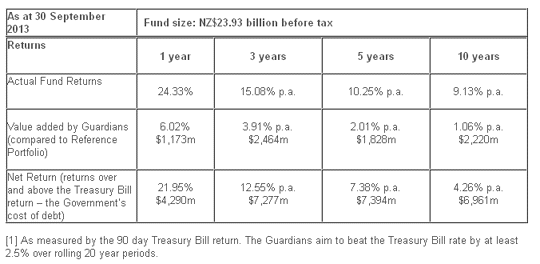
By Gareth Vaughan
It's a myth that it never makes sense to borrow to invest, says CEO of the Guardians of NZ Superannuation Adrian Orr, in comments that appear to contradict recent ones from Finance Minister Bill English.
Speaking to the Trans-Tasman Business Circle in Auckland Orr noted the Super Fund, celebrating its tenth anniversary, stands at $24 billion having had $15 billion of taxpayers' money contributed via the Government, and having made $9 billion in investment returns.
"That is 400 basis points above the cost of government debt, almost two times the cost of government debt which is often used as one of those sayings 'oh it doesn't make sense to borrow to invest'," Orr said.
"Just on that myth, it does in certain circumstances. If you are an individual and you are concerned about your job, you've got a mortgage to pay, you're uncertain about your health, then you might be a bit crazy to borrow a whole lot of money to invest in global equity markets for an unknown period of time. That's called taking a significant risk, and mostly related to your liquidity requirements and your time horizon. So yes at certain times it doesn't make sense to borrow to invest."
"But when you're sitting here with a Crown balance sheet with a known purpose, with an inter-generational time horizon, with known liquidity, then the odds are firmly stacked in your favour to be investing for the long-term on the way through," said Orr.
"Our work shows that if you go back to 1929 you can pick any consecutive 20 year period, start at 1929 and go out to 1949, start at 1930 and go out to 1950 and so on, you beat the government risk free rate of return. And over 90% of the time you beat it by 2.5% per annum. And that's our expectation over any 20% period we will beat the return on government debt by about 2.5% per annum.
"We will create wealth but it's because of the long-term investment disciplines we have in place on the way through," added Orr.
The National-led government suspended contributions to the Super Fund in 2009. English recently said this happened because with fiscal deficits and government debt already increasing, it was "imprudent to borrow more to invest in global financial markets."
English said it's the Government's intention to resume contributing to the Fund once net debt has reduced to 20% of GDP, which is forecast for 2020. Labour Finance Spokesman David Parker says the Government should resume payments to the Super Fund as soon as it gets into surplus, which is forecast for 2014/15.
Meanwhile, Orr said the Super Fund has paid $3.3 billion in tax to the Government over the past decade.
"So although we're not being capital funded anymore, we're still actually paying tax. I think we were New Zealand's largest corporate taxpayer last year, just short of $1 billion in tax paid to the New Zealand government."

11 Comments
Bollocks.
With a capital B.
I don't care how far back you go, your projections are no use in ascertaining the future.
And it is about time Interest.co asked the hard question. All lobbies - left, right and self - are anticipating endless growth to underwrite forward borrowing, investment and expectation.
It is some kind of sick joke, this far down the tracks, to be still believing the delusion that 'having money' will always mean 'being able to buy pieces of the planet'.
Borrowing to invest in a global ponzi scheme is proving a real winner..................until..........POP!
Are we talking nominal or real returns ?
Read the page from Schiller's - " Irrational Exeburance "
Lot's of periods where the S&P took 20 and 25 year periods to return to it's previous levels.
Another very relevant question - How is Mr Orr valuing the Super Catastrophe policies he purchased - the ones Berkshire Hathaway passed on ? Bound to be of real quality - Yeh Right . Could still bight the ass years down the track. That's why they are called Super Cats.
How would his fund have performed if he had just purchased index funds offshore, ie removed any management input and saved all the transactionbal costs?
How has the return achieved been inflated by the very strong rise in equity markets around the world the last few years since the presses started rolling ? Maybe a component of got lucky involved here.
I totally disagree it makes sense to borrow to invest in markets.
Gareth, the future is different.
regards
Orr is wrong.
Peak oil guarantees we lose it.
regards
Mr Orr is right , of course ... and it's a crying shame that during the GFC , Wild Bill lost his nerve and refused to put more money into the Cullen Fund ...
... when there's blood in the streets is the time to dive in , not scuttle away like a timorous wee beastie ...
Curious to know why the Cullen fund has to pay tax to the government : That is so bizarre : Surely the idea is to grow the fund , to compound it up , as fast as we can ?
Good on you , Adrian !
Yes I would like to know too, GBH. The "tax" paid is essentially a dividend. I can't understand why the government would be extracting funds in the form of tax when the whole idea was to fund superannuation in the future. Seems a little self defeating. Wouldn't the NZ public be willing to make exemptions for tax in this case?
If we borrow to invest into property, why not borrow to invest into equities?
Concept is fundamentally the same - i.e to grow net worth, and both assets can go up and down with market cycles.
Maybe the Govt could recycle the tax earned and keep pumping money into the fund to compound its return and relieve some of the issues facing the country as the population ages
The SuperFund is doing an excellent job IMHO.
Have you ever traded a book for any financial security where position was funded with other people's money - hence they had recourse to the asset in the event of a trading failure much the same one assumes you encountered when you recommended doubling down on MRP when it fell back to 232 cents?
You really do need to think of the consequences of outcomes beyond the moral hazard backstop of Federal Reserve and BOJ monthly money printing actions valued @ USD 160.00 billion. So does Mr Orr.
I agree with Adrian and also practice what I preach ... I have enough money invested in various global stock markets to pay off the $280,000 mortgage but currently I am easily beating the 5.19% cost of those funds so for the moment will maintain the share portfolio. Should interest rates rise as my 2yr fixed rate nears its re-fixing date in 2015 I may revisit my strategy.
Nevasellayapropertya - I also agree.
I don't think there are very many investors in the stock markets who post on this site. Many people in NZ got bitten in the sharemarket during the 1987 crash and many deem all share trading as highly risky yet there are so many strategies that work well whatever direction the market goes that you can protect your position.

We welcome your comments below. If you are not already registered, please register to comment
Remember we welcome robust, respectful and insightful debate. We don't welcome abusive or defamatory comments and will de-register those repeatedly making such comments. Our current comment policy is here.